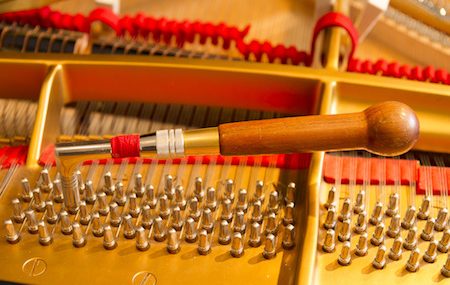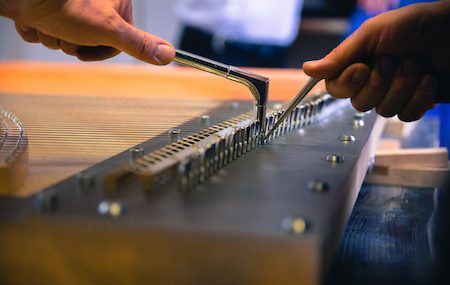How often should I tune my piano?
After all, you want it to sound its best every time you play. You also want to keep your piano in the best shape possible. All of that relies on having your piano tuned on a regular basis.
But how often should you hire it done? What are the secrets to tuning your piano? Here are a few things to keep in mind.
Pianos have 231 strings attached to the keys and hammers inside your piano. Together they create about 170 pounds of pressure. Every time you press down on a key, it triggers a reaction to create noise. The key triggers the string to move and complete its action.
But under that much pressure, the tension slowly fades. It might not be noticeable right away, but over time it changes.
That’s why tuning your piano is so important.
That tension changes every day, whether you play it or not, whether you move it or not. It depends on age, whether it’s brand new, or is a family heirloom.
Think of your piano as a living, breathing object. It changes depending on everything that makes your house a home. The air around it. The humidity levels. Changes in weather. Even the way you use it.
If your piano is brand new, follow your dealers and manufacturers guidelines. In most cases, it’s important to have your piano tuned once every three months during the first year. This is called the breaking in period. These steel strings are adjusting to the pressure they’re under inside the piano. It’s easy for them to move and fall out of tune.
As pianos age, tuning should take place once or twice per year. If you work with a tuner on a regular basis, they can help you set up a plan that works best for you.
If you have an old piano that hasn’t been tuned in years, they might not be able to take the strain of tuning. The wires may be brittle, breaking if they are turned.
Moving a piano doesn’t necessarily make your piano go out of tune. Instead, it’s the impact of the new surrounding area that can affect it. Don’t have it tuned the moment it arrives in a new home. Instead, wait and let it adjust to its new area – new floors, new heating and cooling systems, new humidity levels. Only then should you bring in a tuner and let him adjust your piano.
When was the last time you had your piano tuned?



